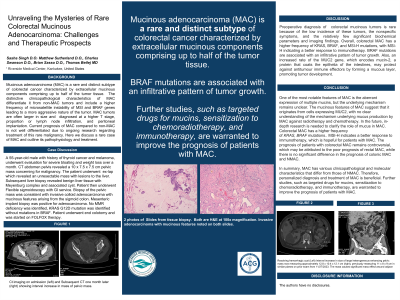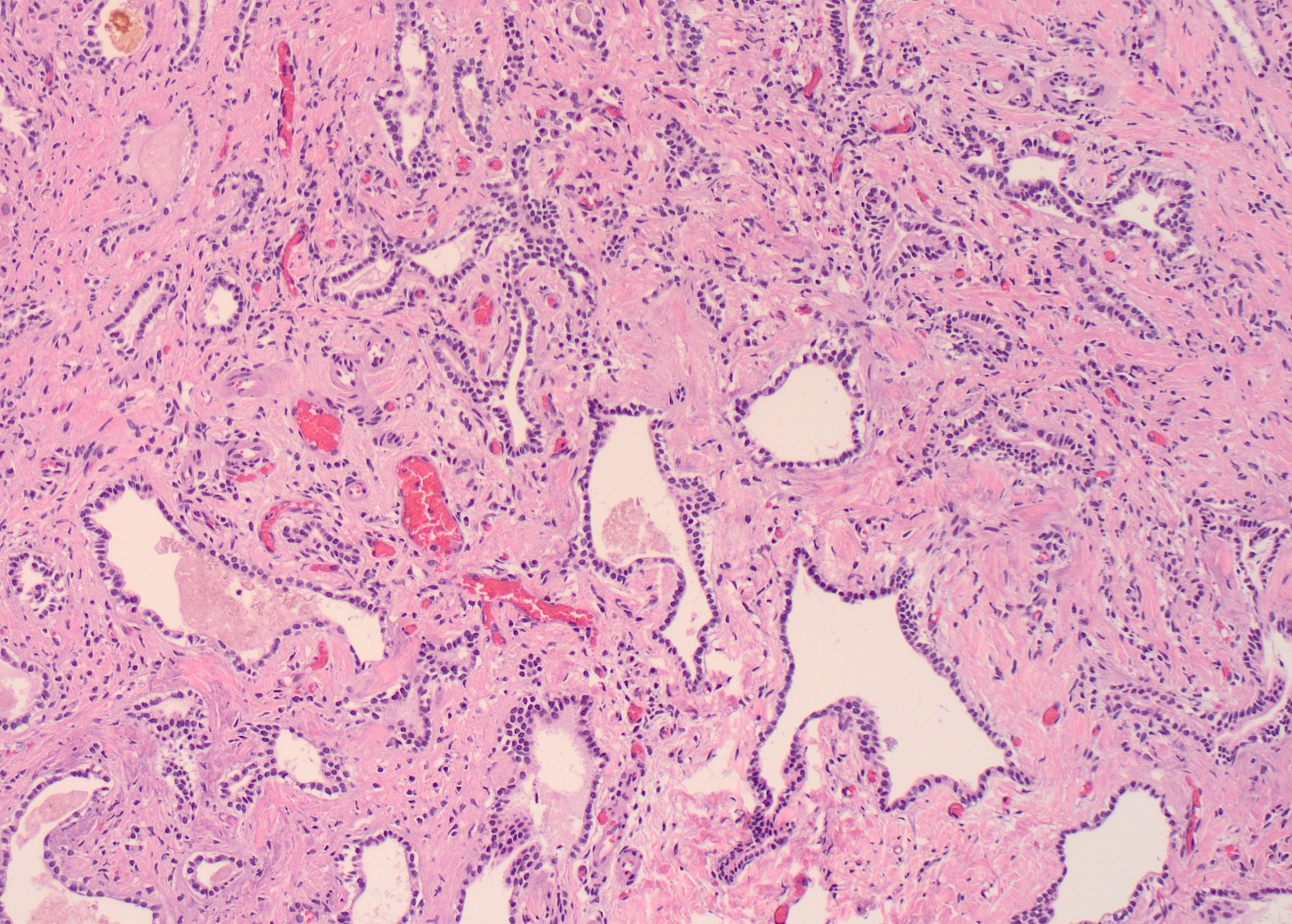Sunday Poster Session
Category: Colon
P0338 - Unraveling the Mysteries of Rare Colorectal Mucinous Adenocarcinoma: Challenges and Therapeutic Prospects
Sunday, October 27, 2024
3:30 PM - 7:00 PM ET
Location: Exhibit Hall E

Has Audio
- SS
Sasha Singh, DO
Riverside Medical Center
Bourbonnais, IL
Presenting Author(s)
Sasha Singh, DO1, Matthew Sutherland, DO2, Dhaval Patel, DO2, Brian Sasso, DO2, Charles Swanson, DO2, Cassandra Lacher, DO2, Thomas Betlej, MD2
1Riverside Medical Center, Bourbonnais, IL; 2Riverside Medical Center, Kankakee, IL
Introduction: Mucinous adenocarcinoma (MAC) is a rare and distinct subtype of colorectal cancer characterized by extracellular mucinous components comprising at least half of the tumor tissue. The distinctive clinicopathological characteristics of MAC differentiate it from non-MAC tumors and include a higher frequency of microsatellite instability (MSI) and BRAF genes leading to a more aggressive nature of the tumor. MAC tumors are often larger in size and diagnosed at a higher T stage, proportion of lymph node infiltration, and peritoneal implantation. Current prognosis of MAC compared to non-MAC is not well defined due to ongoing research regarding treatment of this rare malignancy. Here we discuss a rare case of MAC and outline its pathophysiology and treatment.
Case Description/Methods: A 55-year-old male with history of thyroid cancer and melanoma, underwent evaluation for severe bloating and weight loss over a month. CT abdomen pelvis revealed a 10 x 7.5 x 7.5 cm pelvic mass concerning for malignancy. The patient underwent ex-lap which revealed an unresectable mass with lesions to the liver. Liver biopsy revealed benign liver tissue with Meyenburg complex and associated cyst. Mesenteric implant biopsy completed intra-operatively was positive for adenocarcinoma. Biopsy of the pelvic mass during colonoscopy was consistent with invasive colloid adenocarcinoma with mucinous features arising from the sigmoid colon. KRAS G12D mutation was identified without mutations in BRAF. The patient was started on FOLFOX therapy.
Discussion: Preoperative diagnosis of colorectal mucinous tumors is rare because of the low incidence of these tumors, the nonspecific symptoms, and the relatively few significant biochemical parameters/imaging findings. Overall, colorectal MAC has a higher frequency of KRAS, BRAF, and MSI-H mutations, with MSI-H indicating a better response to immunotherapy. BRAF mutations are associated with an infiltrative pattern of tumor growth. Also, an increased rate of the MUC2 gene, which encodes mucin-2, a protein that coats the epithelia of the intestines, may protect against antitumour immune effectors by forming a mucous layer, promoting tumor development. In summary, MAC has various clinicopathological and molecular characteristics that differ from those of non-MAC. Therefore, personalized diagnosis and treatment of MAC is beneficial. Further studies, such as targeted drugs for mucins, sensitization to chemoradiotherapy, and immunotherapy are warranted to improve the prognosis of patients with MAC.

Disclosures:
Sasha Singh, DO1, Matthew Sutherland, DO2, Dhaval Patel, DO2, Brian Sasso, DO2, Charles Swanson, DO2, Cassandra Lacher, DO2, Thomas Betlej, MD2. P0338 - Unraveling the Mysteries of Rare Colorectal Mucinous Adenocarcinoma: Challenges and Therapeutic Prospects, ACG 2024 Annual Scientific Meeting Abstracts. Philadelphia, PA: American College of Gastroenterology.
1Riverside Medical Center, Bourbonnais, IL; 2Riverside Medical Center, Kankakee, IL
Introduction: Mucinous adenocarcinoma (MAC) is a rare and distinct subtype of colorectal cancer characterized by extracellular mucinous components comprising at least half of the tumor tissue. The distinctive clinicopathological characteristics of MAC differentiate it from non-MAC tumors and include a higher frequency of microsatellite instability (MSI) and BRAF genes leading to a more aggressive nature of the tumor. MAC tumors are often larger in size and diagnosed at a higher T stage, proportion of lymph node infiltration, and peritoneal implantation. Current prognosis of MAC compared to non-MAC is not well defined due to ongoing research regarding treatment of this rare malignancy. Here we discuss a rare case of MAC and outline its pathophysiology and treatment.
Case Description/Methods: A 55-year-old male with history of thyroid cancer and melanoma, underwent evaluation for severe bloating and weight loss over a month. CT abdomen pelvis revealed a 10 x 7.5 x 7.5 cm pelvic mass concerning for malignancy. The patient underwent ex-lap which revealed an unresectable mass with lesions to the liver. Liver biopsy revealed benign liver tissue with Meyenburg complex and associated cyst. Mesenteric implant biopsy completed intra-operatively was positive for adenocarcinoma. Biopsy of the pelvic mass during colonoscopy was consistent with invasive colloid adenocarcinoma with mucinous features arising from the sigmoid colon. KRAS G12D mutation was identified without mutations in BRAF. The patient was started on FOLFOX therapy.
Discussion: Preoperative diagnosis of colorectal mucinous tumors is rare because of the low incidence of these tumors, the nonspecific symptoms, and the relatively few significant biochemical parameters/imaging findings. Overall, colorectal MAC has a higher frequency of KRAS, BRAF, and MSI-H mutations, with MSI-H indicating a better response to immunotherapy. BRAF mutations are associated with an infiltrative pattern of tumor growth. Also, an increased rate of the MUC2 gene, which encodes mucin-2, a protein that coats the epithelia of the intestines, may protect against antitumour immune effectors by forming a mucous layer, promoting tumor development. In summary, MAC has various clinicopathological and molecular characteristics that differ from those of non-MAC. Therefore, personalized diagnosis and treatment of MAC is beneficial. Further studies, such as targeted drugs for mucins, sensitization to chemoradiotherapy, and immunotherapy are warranted to improve the prognosis of patients with MAC.

Figure: H&E at 100x magnification of pathology slides consistent with mucinous colon carcinoma. Slides obtaines from pelvic mass biopsy during colonoscopy.
Disclosures:
Sasha Singh indicated no relevant financial relationships.
Matthew Sutherland indicated no relevant financial relationships.
Dhaval Patel indicated no relevant financial relationships.
Brian Sasso indicated no relevant financial relationships.
Charles Swanson indicated no relevant financial relationships.
Cassandra Lacher indicated no relevant financial relationships.
Thomas Betlej indicated no relevant financial relationships.
Sasha Singh, DO1, Matthew Sutherland, DO2, Dhaval Patel, DO2, Brian Sasso, DO2, Charles Swanson, DO2, Cassandra Lacher, DO2, Thomas Betlej, MD2. P0338 - Unraveling the Mysteries of Rare Colorectal Mucinous Adenocarcinoma: Challenges and Therapeutic Prospects, ACG 2024 Annual Scientific Meeting Abstracts. Philadelphia, PA: American College of Gastroenterology.
